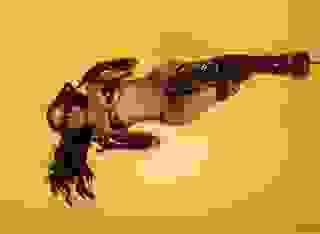- Gay Male
- Lebanon Hostage Ch. 02
Note: You can change font size, font face, and turn on dark mode by clicking the "A" icon tab in the Story Info Box.
You can temporarily switch back to a Classic Literotica® experience during our ongoing public Beta testing. Please consider leaving feedback on issues you experience or suggest improvements.
Click here* * * * * * * * * * * * *
Note to the webmaster: Please include the "What you're about to read" note, the chapter title, and the dates in parentheses (March-May 1986) in the body of the story, as they appear below. (You formatted the previous chapter in this series in the same way when you posted it online.)
There are a number of italicized words in the body of the story—foreign words and emphasized words. I'd like to preserve these italics in the online version. There are also some accented e's, in the French name Jérémie, which I'd like to preserve if possible.
Please tell me if, for future submissions (or for this submission), it would be helpful for me to code italicized words and accented letters for you in the Word document, HTML-style: <i> and </i>, or é. If that's helpful, I'm happy to do it.
Many thanks!
* * * * * * * * * * * * *
What you're about to read: This is a work of historical fiction—recent history—inspired by actual accounts, so it's rather realistic though definitely fictional. The novella is built around themes I find erotic: captivity, sexual tension, male intimacy. However (disclaimer and spoiler), you won't find any full-blown sex here. This is the story of a queerly romantic, lopsidedly erotic, but unconsummated relationship between a gay man and a straight man held together as hostages.
Chapter 2 -- My hostage life begins
(March-May 1986)
Years later, I will still remember my kidnapping—the trip from Adnan's car to my first underground cell—in vivid detail. But my memories of what comes after that, the beginning of my life as a hostage, will be fragmentary and confused.
* * *
I will remember clearly, at least, my daily routine. That's easy. There's not that much to remember.
In the morning, they bring me my breakfast, invariably the same: a piece of flatbread with a slice of white cheese folded inside it, and a glass of tea. I eat. Then I wait... I don't know how long. Half an hour? An hour? They return to recover the glass and take me to what passes as a bathroom.
The toilet run is the most active and complicated five minutes of my day. It is rushed, almost frenetic: they have a whole cellblock of prisoners to get through. I am hustled along by my arm, blind, my head bent down to avoid hitting the low ceiling. I carry my empty water bottle in one hand and my full pee bottle in the other.
The bathroom is up the stairs, adjacent to the room where the guards spend their time, where the television plays. It is a narrow closet, tiled all around like my cell, but sopping wet and black with mold. It contains no washbasin—just a squat toilet and, beyond that, standing room with a drain in the floor for the days I'm allowed to shower. Behind me, the bathroom's entrance is covered with an opaque shower curtain, so I'm able to lift my blindfold while I'm alone inside. There is no light bulb: I have to make do with the light filtering in through the gaps above and below the curtain.
Early in my captivity, figuring out how to use the squat toilet is an added source of stress. Bernie's apartment had a squat toilet, and he showed me the stance, but I don't think I'm doing it right. I feel like I'm too high in the air and at too much of an angle. To keep my balance, I have to put my hands on the disgusting floor. Bernie kept toilet paper and a tiny wastebasket next to his toilet; here, I assume, I'm supposed to make use of the hose hanging off the wall. Seeing no alternative, I use the same hose to flush the toilet, which, unlike Bernie's, lacks anything I can recognize as a flushing mechanism. I rinse out my pee bottle with the hose as well.
The first time they take me to the bathroom, I bring my toothbrush, only to remember that I'm not supposed to drink the tap water. So I brush my teeth in my cell, using potable water from my drinking bottle, which a guard refills for me while I'm in the bathroom. For quite a while, I confine myself to a miniscule dot of toothpaste, so I can swallow it when I'm done. Later it dawns on me that I can spit out into my pee bottle. I feel stupid for not having figured that out sooner.
They allow me only a very few minutes in the bathroom before a guard starts slapping the shower curtain and growling "Yallah," which is the word they use when they want me to hurry up. Periodically, every several days, they tell me, "Douche," and then I'm allowed an extra minute or two to strip down and rinse my body—there's no soap—with cold water from the hose. I have no towel; I put my pajamas back on my wet body. Soon I start using my shower time to rinse out my underwear and sometimes my socks. My pajamas are never laundered or changed.
After the hectic toilet run in the morning, I have nothing to do until the end of the day, when they bring me dinner: rice mixed with some kind of vegetable—lentils, or peas, or beans, or green beans—scooped from a pot into the plastic bowl I have in my tub. Occasionally I receive a mandarin orange or a small banana as well. My tub contains both a plastic fork and a plastic spoon; they have conceded me the luxury of choosing which utensil to eat with. Fairly often the food is salted or spiced, but other times it's plain. It's always unheated, as if it's been sitting out for hours. I worry about food contamination.
There's another glass of tea with dinner. Sometimes they come back later that evening to recover the glass, sometimes they wait until the next morning. My plastic bowl and eating utensils are never taken from me to be washed, so I lick them carefully clean before rinsing out the bowl with a dribble of my potable water; they haven't given me enough to drink that I can spare much. I discard the rinse water into my pee bottle. If they leave the tea glass overnight, I rinse it out too, hoping to win goodwill by being helpful.
After the evening feeding, the guards retreat to their area, at the top of the stairs, to watch TV until they're ready to go to bed.
That is my day. Every day. This is what my life has been reduced to.
For quite a while following my kidnapping, I have no appetite, but I force myself to finish everything I've been given to eat because that is one of the rules. Once my appetite returns, I am always hungry. They give me so little. I am afraid of becoming malnourished.
Initially, being allowed to use the toilet only once a day is easier than I feared it would be. That's because my bowels react to the stress of my kidnapping by becoming constipated. Later I will come to know all too well the physical and psychological suffering caused by the combination of spoiled food and a toilet run still twelve hours in the future.
My basic bodily needs will be a major preoccupation for me throughout my time as a hostage: a source of anxiety and relief, pain and pleasure. I've studied enough psychology to wonder if I'm regressing to an infantile stage of development. When I am cut off from the many activities that normally constitute my life—school, work, leisure—eating and eliminating are among the few things left for me to do. They are, indeed, the only scheduled activities of my day. And my captors dictate when and how I will do them.
* * *
I cry every day. One or two times if it's a good day; several times if it's a bad day. The first days are all bad days. I am a weeper by temperament. In normal life, not hostage life, I like to cry when I read a novel or watch a movie. I enjoy a good cry, the catharsis, the satisfaction of knowing what a sensitive person I am. Here, that temperament does not serve me well. It keeps me from getting a firm footing. I am emotionally wobbly, a problem exacerbated by poor sleep. The crying can start without warning, without any obvious trigger.
The first couple of times I cry, I let myself go, hoping—I am ashamed to admit this—that the kind guard will hear and come back and give me comfort. That doesn't happen. I just get angry men pounding on my door. So when I cry, I fight to do so quietly. But I can only keep that fight up for so long.
I am most likely to cry at night. Once the guards have gone to bed, all activity ceases, and the only sound I hear anymore is the noisy ventilation machine down the cellblock. During those hours, I lie on my mattress looking up toward the ceiling, up toward the outside world, some unbridgeable distance over my head—and I feel so cut off. None of the people who want to help me can help me. The men who have taken me can do whatever they want to me.
Unfortunately, night is also the time when my crying is most likely to anger the guards, who are trying to sleep. For the first couple of days after my kidnapping, they hold me in a cell just at the bottom of the stairs from their living area. They close the metal door at the top of the stairs in the evening, but judging from how clearly I can still hear the television, there must be an open grate in the door like the one atop the door to my cell. So when I reach the point—as I always do—where my sobbing escapes my control, the sound will carry, and someone will come and hammer on the door at the top of the stairs.
On my second or third night (I don't remember which, the days blur together in my memory), a guard becomes fed up and storms into my cell. Hauling me up by the front of my pajama top into a sitting position, he slaps my face, repeatedly. My blindfold, cut from a towel, partially mutes the sting, but the slapping does nothing to help me stop crying. The guard drops me back onto my mattress, stands, and starts kicking my thigh. I roll over onto my side, into a ball, so that the kicks land on my buttocks. I'm fortunate, I suppose, that since I've roused him from bed he's kicking me barefoot, not in shoes or boots.
Another guard comes. He orders my assailant away, then snaps at me to be quiet and go to sleep. I bury my face in the mattress to muffle my crying until I've managed to get myself under control again.
The next morning, when the guards bring me back from my toilet run, they take me to a different cell, farther away from the stairs and on the opposite side of the cellblock. The new cell is identical in dimensions and design to the first, except that it is the mirror image: the door is now on the left-hand side of the cell, when I face it from the inside, not the right-hand side as before.
When they bring me into the new cell, it is completely empty. My only possessions now are the clothes I'm wearing and the two bottles I carried back with me from the toilet run. I despair: this new depth of privation must be part of my punishment. But after they've completed the other prisoners' toilet runs, the guards return, lugging in my mattress, blanket, and tub from the first cell. I am filled with relief. I would babble my thanks to the guards if I dared speak to them.
The guards have set my mattress against the side wall farthest from the cell door to leave themselves a walking space when they enter. Because the door is now on the left side of the cell, this means my mattress is on the right side—which means that everything is backwards compared to my last cell. I find the reversal disturbing. I know I'm overreacting, and that knowledge disturbs me further. Why is such an insignificant thing affecting me so much?
The ventilation machine I could hear down the way from my first cell is located just outside my new cell. The machine is tremendously loud and runs constantly unless there's a power outage. Sleep is even more difficult for me now. Under the mechanical noise, I can still hear other cell doors closing during the feedings and toilet runs. But I can no longer hear the guards' television, which presumably means they can't hear me crying anymore.
I am ashamed that I cry so much. It makes me feel weak. It shows that I am weak. The guards must disdain me, must regard me as less than a man.
Is it possible they suspect I'm gay? Please, God, no...
I hate myself for being this way.
* * *
Not long after I have been moved—the next day? the day after that?—two guards appear at my door some time following the evening feeding. They tell me to stand up. Without saying anything more, they take me out of the cell. I'm apprehensive: this isn't part of the daily routine.
They direct me blindfolded down the odd zigzag path I now have to follow to reach the bathroom. But this isn't a toilet run. They take me instead, I think, into the guards' living area; I'm not certain since I don't hear the television. My emotions lurch between fear and hope. I fear they are about to do something to hurt me—since I think I may be in the room where the guards sleep, the possibility of rape leaps yet again to mind. On the other hand, I hope desperately that they are letting me go.
A voice older than any of the guards' says, in accented but fluent English, "Hello, Jeremy. I am a chef." In the moment, I don't know what to make of this statement. Did I mishear? Did he misspeak? Is "chef" some kind of code? Is his name "Ashef"? Later, back in my cell, replaying this conversation in my memory, I will deduce that chef is French for "chief." This man is a leader.
"Are you well?" he asks me.
What am I supposed to say to that? I tell him exactly how I'm feeling. "I'm scared. I want to go home."
"The brothers tell me that you cry often," the chef says. "Is this because you are frightened, or do you have some pain or illness in your body?"
"Because I'm frightened," I mumble. Having to talk with this man about my crying is humiliating.
"You must calm yourself," he says in a mildly sympathetic tone. "We do not intend that any harm should come to you, God willing. As soon as certain matters are resolved, you will go home."
Again, as on the day of my kidnapping, I want to ask what they are demanding for my release—and again, I do not dare. Since they haven't volunteered the information and have told me not to ask questions, for some reason they must not want me to know.
"Your uncle has sent a message for you by television," the chef continues. "He tells you to be strong and to know that your family loves you very much."
Don't cry, don't cry, for God's sake, don't cry...
"You have become famous, Jeremy. The world knows your name. There are many people who pray for you and wish you well. Do you pray?"
The question is unexpected. "Um... yes."
"I am glad. May faith in God give you comfort. I know this is a difficult time for you. Pray to God that he will help you endure. Now we are going to take a photo."
They stand me with my back against a wall. The chef tells me to remove my blindfold but to keep my eyes closed. I am to face straight ahead. I will open my eyes when he tells me, and I will close them again as soon as he tells me.
I wait with my eyes squeezed conspicuously shut as preparations are made. Then: "Open your eyes." I barely have time to register the bright lamp shining in my face and shadowy figures behind it before the camera clicks and the chef orders me to close my eyes again. I obey immediately.
Someone steps forward to retie my blindfold. I'm wondering how awful I will look in the photo: uncombed, unshaved, unrested. I hope, for my mother's sake, that I don't come out looking wide-eyed terrified—or like I've spent the past few days crying.
"That is all, Jeremy," the chef says. "Be well. Pray and be calm."
Someone takes my arm to lead me away. "Can I write a letter to my family?" I ask quickly.
"Not now. But later, yes."
When, later? I'm too cowardly to ask. At least composing a letter to my family in my head will give me a way to pass the time.
* * *
In theory, the world is still out there. Up there. Bernie's apartment, the airport out of here, the United States, my family, my college. In practice, my universe has shrunk down to my cell, the bathroom, and the black space between them.
The trip from my new cell to the bathroom is short but oddly complicated. A few paces to the right of my cell, then a sharp turn to the left, followed quickly by a turn to the right again, then several more paces forward bring me to the stairs that lead up to the bathroom. It is as if I am turning from one short corridor into another—except that the turn does not muffle the sound of the ventilation machine, which I would expect if I were, in fact, turning a corner into a different corridor than the one the ventilator is located in. I wonder if the zigzag turn is simply to confuse me, to give me a false picture of where I am.
Not being able to visualize the space outside my cell is disorienting, which makes me feel vulnerable. I could quickly solve this problem by looking through the barred gap at the top of my door. Since the door is only as tall as I am, I wouldn't even have to get up on tiptoe to see out, all I have to do is to stand next to my mattress. But I have been warned: that barred gap is death. The temptation to peek out is easily trumped by the threat of being shot if I see a guard somewhere out there looking back at me.
Even so, it isn't possible for me to perfectly obey the rule about not looking out of my cell. Sitting or lying on my mattress, every time I look up at the door I can't help but get, through the barred gap, an illicit glimpse of dark gray concrete and the seam where the low ceiling meets a wall. This is evidently the back wall of our small underground prison: the guards never walk past my door in that direction, nor do I ever hear other cell doors in that direction. The guards have put me as far away from them as they can.
From the sound of closing doors, I know that there are cells to the right of me and across from me. During the couple of days I was kept in the cell beside the stairs to the bathroom, I could hear the guards taking other prisoners past my door during the toilet runs. I could even glimpse their legs flitting past the fan embedded in the lower half of the cell door. The other prisoners are only a vague presence to me, even more so now that I have been moved to the back of the cellblock, where no one passes my door and where the ventilator prevents me from hearing sounds from other cells.
The cellblock is never silent. The ventilator goes off during power outages, which are frequent. But when that happens, a guard comes down the stairs into the cellblock and does something that produces a loud, non-stop, static hissing. At first I think they do this as sheer psychological torture. Eventually I decide that the static is to keep prisoners from using the silence of the power outage to whisper to one another. I feel a little safer if I can figure out a reason for what the guards do. A discernible logic sets a limit to the horrors that might otherwise be possible.
Because the static has only one pitch, it is not as loud as the ventilator. So if the power is out, the static doesn't prevent me from hearing a cough somewhere in the cellblock, for instance, or the sound of a guard talking with the prisoner in the cell next to mine. Such exchanges don't occur too often. The guards frequently work in silence: we prisoners know the daily routine, so we normally know why the guards are coming to our cells, they don't need to tell us, and there's typically nothing they want us to tell them. But I'm fairly certain, from conversations I overhear now and then, that my neighbor to the right of my new cell is French. I've never been able to make out any of his words, just the tone of his voice, but I've heard guards talk to him in what sounds like broken French instead of broken English—more than the smattering of French words included in the vocabulary they use to talk to me.
In our prison, background noise is constant; light is not. Like the ventilator, the fluorescent lighting outside the cells is constantly on—even at night, when the guards have gone to bed—except during power outages. Then the cellblock becomes pitch black. The darkness wakes childish terrors in me. I need the half-light passing constantly through my fan and the barred gap at the top of my door. It is my comforting nightlight. When the guards approach my cell during an outage, I can see through the openings in the door, before I pull down my blindfold, the glow of candles or the eerie, dancing beam of a flashlight.








